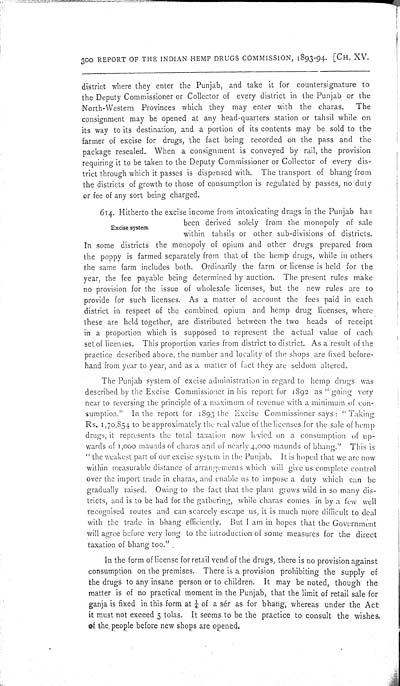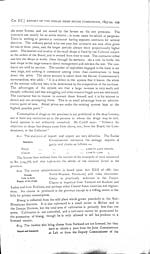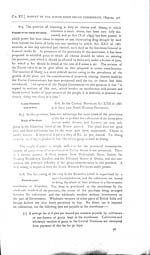Medicine - Drugs > Report of the Indian Hemp Drugs Commission, 1894-1895 > Volume I
(334) Page 300
Download files
Individual page:
Thumbnail gallery: Grid view | List view

300 REPORT OF THE INDIAN HEMP DRUGS COMMISSION, 1893-94. [CH. XV.
district where they enter
the Punjab, and take it for countersignature to
the Deputy Commissioner or Collector of every district in the
Punjab or the
North-Western Provinces which they may enter with the charas.
The
consignment may be opened at any head-quarters station or tahsil
while on
its way to its destination, and a portion of its contents may be
sold to the
farmer of excise for drugs, the fact being recorded on the pass and
the
package resealed. When a consignment is conveyed by rail, the
provision
requiring it to be taken to the Deputy Commissioner or Collector of
every dis-
trict through which it passes is
dispensed with. The transport of bhang from
the districts of growth to those of consumption is regulated by
passes, no duty
or fee of any sort being charged.
Excise system.
614. Hitherto the excise
income from intoxicating drugs in the Punjab has
been derived solely from the
monopoly of sale
within tahsils or other sub-divisions of districts.
In some districts the monopoly of opium and other drugs prepared
from
the poppy is farmed separately from that of the hemp drugs, while
in others
the same farm includes both. Ordinarily the farm or license is held
for the
year, the fee payable being determined by auction. The present
rules make
no provision for the issue of wholesale licenses, but the new rules
are to
provide for such licenses. As a matter of account the fees paid in
each
district in respect of the combined opium and hemp drug licenses,
where
these are held together, are distributed between the two heads of
receipt
in a proportion which is supposed to represent the actual value of
each
set of licenses. This proportion varies from district to district.
As a result of the
practice described above, the number and locality of the shops are
fixed before-
hand from year to year, and as a matter of fact they are seldom
altered.
The Punjab system of
excise administration in regard to hemp drugs was
described by the Excise Commissioner in his report for 1892 as
"going very
near to reversing the principle of a maximum of revenue with a
minimum of con-
sumption." In the report for 1893 the Excise Commissioner says:
"Taking
Rs. 1,70,854 to be approximately the real value of the licenses for
the sale of hemp
drugs, it represents the total taxation now levied on a consumption
of up-
wards of 1,000 maunds of charas and of nearly 4,000 maunds of
bhang." This is
"the weakest part of our excise system in the Punjab. It is hoped
that we are now
within measurable distance of arrangements which will give us
complete control
over the import trade in charas, and enable us to impose a duty
which can be
gradually raised. Owing to the fact that the plant grows wild in so
many dis-
tricts, and is to be had for the gathering, while charas comes in
by a few well
recognised routes and can scarcely escape us, it is much more
difficult to deal
with the trade in bhang efficiently. But I am in hopes that the
Government
will agree before very long to the introduction of some measures
for the direct
taxation of bhang too."
In the form of license
for retail vend of the drugs, there is no provision against
consumption on the premises. There is a provision prohibiting the
supply of
the drugs to any insane person or to children. It may be noted,
though the
matter is of no practical moment in the Punjab, that the limit of
retail sale for
ganja is fixed in this form at 1/4 of a sér as for bhang, whereas
under the Act
it must not exceed 5 tolas. It seems to be the practice to consult
the wishes
of the people before new shops are opened.
Set display mode to: Large image | Zoom image | Transcription
Images and transcriptions on this page, including medium image downloads, may be used under the Creative Commons Attribution 4.0 International Licence unless otherwise stated. ![]()
| India Papers > Medicine - Drugs > Report of the Indian Hemp Drugs Commission, 1894-1895 > Volume I > (334) Page 300 |
|---|
| Permanent URL | https://digital.nls.uk/74574734 |
|---|---|
| Description | Chapter XV, cont. |
| Description | [Volume 1]: Report. |
|---|---|
| Attribution and copyright: |
|




